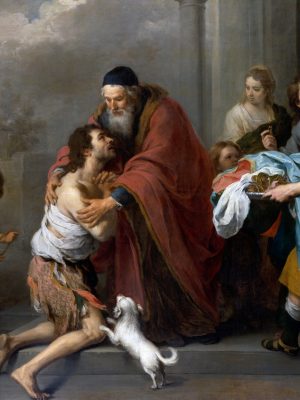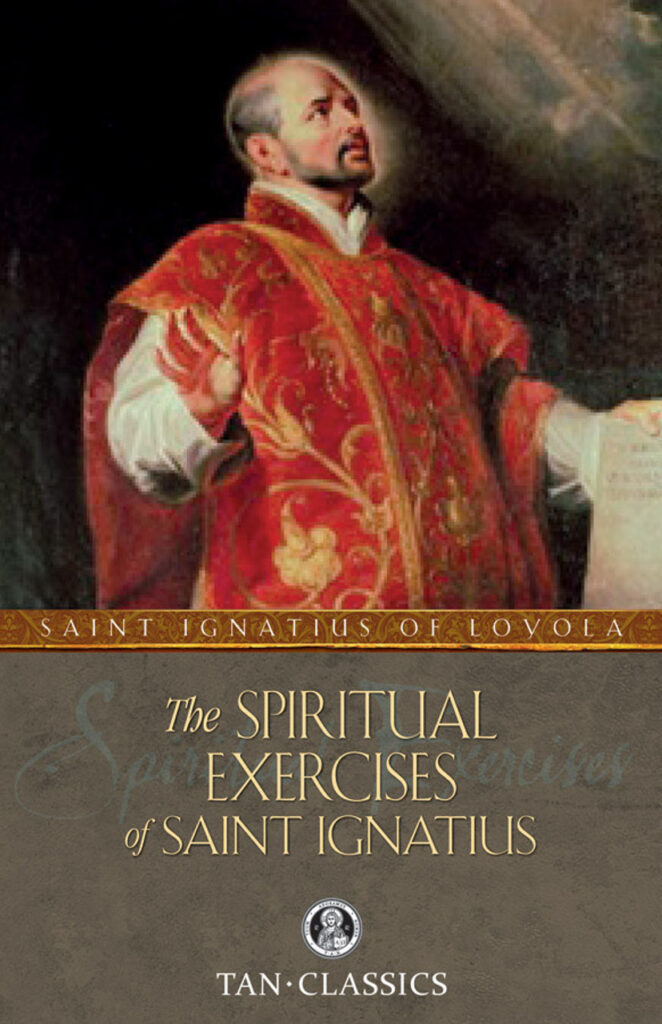The Spiritual Exercises outline the rigorous self-examination and spiritual meditations of St. Ignatius, written to pave a path to holiness through contemplation, prayer, and discipline. This excerpt is a thorough meditation on the story of the Prodigal Son.
Preparatory Meditation
First, represent to yourself the prodigal son returning to his father after long wanderings.
Second, ask of Our Lord the grace to imitate the repentance of the prodigal and, like him, obtain pardon for your past sins.
The Prodigal Son
“A certain man had two sons; and the younger of them said to his father, Father, give me the portion of substance that falleth to me. And he divided unto them his substance. And not many days after, the younger son, gathering all together, went abroad into a far country, and there wasted his substance, living riotously. And after he had spent all, there came a mighty famine in that country, and he began to be in want. And he went and cleaved to one of the citizens of that country. And he sent him to his farm to feed swine. And he would fain have filled his belly with the husks the swine did eat: and no man gave unto him.” (Luke 15:11–16)
Youth
He is young. The passions of youth: here we see the cause of his error. Youth is the age of illusions: the prodigal promised himself a happy and brilliant life away from the paternal mansion. Youth has a passion for pleasure: the prodigal sighed after gaieties of the world; he envied other youths of his age the pleasures of idleness, the noisy joys of their amusements, the success of their mad passions.
Youth is, above all, jealous of its independence: the prodigal is weary of the constraint his father’s presence imposes on him; he wishes to be the master of his liberty and the arbiter of his destiny. Look within yourself: what have been the causes of your errors, if not the illusions of the world, the passion for pleasure, the fatal love of independence?
Greed
“Father, give me the portion of substance that falleth to me.” He asks of his father that portion of the heritage that comes to him. What ingratitude! The name alone of father, ought it not to have recalled to him all the benefits bestowed by paternal tenderness, the cares that surrounded his infancy, the lively affection of which he received fresh testimonies every day? What unjust pretensions!
This substance that he claims belongs to his father, who received it from his ancestors or who perhaps owes it to a long series of labors or to prudent economy: by what right does he take it during his father’s lifetime? And what title has he to exact the division of a fortune not yet belonging to him? What foolish temerity! This property once in his hands, what will become of it? Scarcely will he be master of it before he will dissipate it in luxury and debauchery.
Apply these reflections to yourself. Is not God your Father in the order of nature and in the order of grace? When you left Him to serve the world, did you not act like the prodigal, ask for your portion of the heritage, that is, the free disposal of yourself, as if you were not the property of God, who created you and redeemed you, as if you could for a moment become master of yourself without making yourself miserable? What ingratitude in your departure from God! What injustice! What folly!
Worldliness
“And not many days after he went abroad into a far country.” Being now master of his property, the prodigal goes into a distant country. If he remained in the neighborhood of his father’s house, too many memories would trouble him in the midst of his pleasures; he would be in constant fear of the remonstrances of his father’s friends, the presence perhaps of this father himself, the reproaches of his own heart. To give himself up to pleasure with less trouble and more liberty, he goes into a distant country.
Imagine your wanderings, when you gave yourself to the world. You dreaded the exercises of piety, prayer, frequenting of the Sacraments; the society of good people; even meeting the ministers of Jesus Christ, whose zeal might have brought you back to Him; your own reflections and the reproaches of your own conscience—all these you feared. You fled as far from yourself and as far from God as possible, for fear that grace should find you out and restore you, even against yourself, to your Father and God.
Squandered Inheritance
“And there wasted his substance, living riotously.” Away from his father, the prodigal child has soon dissipated his fortune. He does not consider that it is the fruit of his father’s toil; that it is his sole resource for the future; that this fortune, however brilliant it may be, must come to an end in the expenses of luxury and sin. A few months are scarcely passed, and there remains to him nothing of his riches, nothing but dread poverty: “He wasted his substance.”
And what treasures of grace have you not dissipated, far from God! Recall to mind all these losses, and weep for them with tears of blood—loss of the friendship of God; loss of your past merits; loss of those holy inspirations, which you have continually despised; loss of those good examples rendered useless; loss of that Christian education of which you have abjured the principles; loss of those happy dispositions of nature, of that taste for virtue, that uprightness of heart, of that delicacy of conscience, of those favorable tendencies to piety; loss of your talents, which you have prostituted to the service of pleasure and sin; loss of your reason, of your faith, of which you have perhaps even smothered the light. What a sad use of the gifts of your God! “He wasted his substance in riotous living.”
Poverty
“He began to be in want, and he cleaved to one of the citizens; and he sent him into his farm to feed swine.” Sad consequences of the profusion and libertinism of the prodigal!—want, slavery, degradation and infamy. Want. A great famine falls upon the country where the prodigal has gone; and, his riches wasted in luxury, he is left in shameful poverty. In vain he addresses himself to the companions of his excesses, to the friends on whom he had bestowed pleasure and fortune; he is left alone without resource and forced to beg his bread from the pity of a stranger. This country a prey to famine is the world. This hunger is the devouring hunger of the passions, which incessantly cry from the depths of the guilty heart, “Bring, bring” (Prov. 30:15). This indigence is the emptiness of a soul tormented by the want of happiness, and begging it in vain from creatures, which only offer him agitation, regret, disgust, weariness and afflictions without end. O my God, how true it is that in losing You the sinner loses all! “What can be more lost than what is out of God?” (St. Bernard)
“What do you possess if you possess not God?” (St. Augustine) Slavery. What a sad change! This young man so jealous of his liberty obliged to take service with a hard and unfeeling master! He who was such an enemy of all restraint reduced to the lowest occupations! He so haughty, confounded with the vilest slaves! And is not this the humiliating state of the sinner? Like the prodigal, he is the slave, not of one master, but of innumerable tyrants—slave of Satan, who reigns over his mind, his imagination, his heart, his senses; slave of his inclinations, which every moment require the sacrifice of his repose, his conscience, his reason; slave of the world and so must respect its judgments, applaud its maxims, spare its susceptibility, humor its caprices, satisfy its exigencies, dissimulate and suffer without complaint all its ingratitude and injustice; slave of habits, which become a sort of necessity and second nature and that defy all the efforts of grace, all the reflections of reason, all the remorse of conscience.
What a slavery! “Such is the fate of whoever refuses himself to his Father” (St. Peter Chrysologus). Degradation. The prodigal reduced to feed unclean animals and even envying them their degrading food. What disgrace! It is that of the sinner away from his God. There is no pleasure, however gross and brutal, from which he does not seek happiness; he even descends to envy the lowest libertines their most shameful excesses, their most monstrous debauches. He even envies the stupid condition of the brutes, wishing to have like them no law but instinct, no other destiny than the gratification of sense: “Man, when he was in honour, did not understand: he hath been compared to senseless beasts, and is become like to them” (Ps. 48:13).
ooo
This article is taken from a chapter in Spiritual Exercises of Saint Ignatius by Saint Ignatius which is available from TAN Books.









